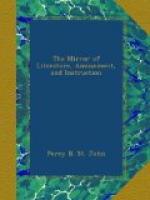“The Italians do not understand the English,” said Byron; “indeed, how can they? for they (the Italians) are frank, simple, and open in their natures, following the bent of their inclinations, which they do not believe to be wicked; while the English, to conceal the indulgence of theirs, daily practise hypocrisy, falsehood, and uncharitableness; so that to one error is added many crimes.” Byron had now got on a favourite subject, and went on decrying hypocrisy and cant, mingling sarcasms and bitter observations on the false delicacy of the English. It is strange, but true as strange, that he could not, or at least did not, distinguish the distinction between cause and effect, in this case. The respect for virtue will always cause spurious imitations of it to be given; and what he calls hypocrisy, is but the respect to public opinion that induces people, who have not courage to correct their errors, at least to endeavour to conceal them; and Cant is the homage that Vice pays to Virtue.[1] We do not value the diamond less, because there are so many worthless imitations of it, and Goodness loses nothing of her intrinsic value because so many wish to be thought to possess it. That nation may be considered to possess the most virtue, where it is the most highly appreciated; and that the least, where it is so little understood, that the semblance is not even assumed.
Byron is, I believe, sincere in his belief in supernatural appearances; he assumes a grave and mysterious air when he talks on the subject, which he is fond of doing, and has told me some extraordinary stories relative to Mr. Shelley, who, he assures me, had an implicit belief in ghosts. He also told me that Mr. Shelley’s spectre had appeared to a lady, walking in a garden, and he seemed to lay great stress on this. Though some of the wisest of mankind, as witness Johnson, shared this weakness in common with Byron; still there is something so unusual in our matter-of-fact days in giving way to it, that I was at first doubtful that Byron was serious in his belief. He is also superstitious about days, and other trifling things,—believes in lucky and unlucky days,—dislikes undertaking any thing on a Friday, helping or being helped to salt at table, spilling salt or oil, letting bread fall, and breaking mirrors; in short, he gives way to a thousand fantastical notions, that prove that even l’esprit le plus fort has its weak side.
[1] Rouchefoucault.
* * * * *
ODE TO THE GERMANS.
BY THOMAS CAMPBELL, ESQ.
The Spirit of Britannia
Invokes across the main,
Her sister Allemania
To burst the Tyrant’s
chain;
By our kindred blood she cries,
Rise Allemanians, rise,
And hallowed thrice the band
Of our kindred hearts shall be,
When your land shall be the
land
Of
the free—of the free!




